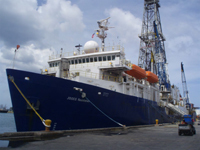
Clive Neal, professor of civil engineering and geological sciences at the University of Notre Dame, is sailing the deep blue sea from Feb. 4 through March 5. His trip is not a pleasure cruise, but a unique journey that is part of a significant moment for the world of ocean research.
Neal is sailing aboard the JOIDES Resolution, a riserless drilling vessel operated by the Integrated Ocean Drilling Program for scientific exploration of the ocean floor. The Resolution left a Singapore shipyard in January for initial sea trials after being completely refurbished and modernized.
In his role as a member of the redesign task force and now chair of the readiness assessment team, Neal leads the group of scientists responsible for determining if the Resolution is ready to resume international operations.
The team is putting the ship’s drilling, coring, logging and science systems through vigorous testing during additional sea trials on the Ontong Java Peninsula, a huge undersea plateau located in the Pacific Ocean, lying north of the Solomon Islands.
Once the Resolution is certified, it will travel to Honolulu for its first expedition: the Pacific Equatorial Age Transect. During this first project, in which they will target eight different sites within a 3-degree latitudinal window, the researchers hope toobtain a sedimentary archive for time periods immediately after the Paleocene/Eocene boundary event through the Miocene period (from 34 million to 5 million years ago).
The JOIDES Resolution began operations in 1978 as an oil exploration vessel. After being converted for scientific research in 1985, it became part of the Ocean Drilling Program (now the Integrated Ocean Drilling Program), where it continued its efforts through 2005. In addition to a crew of 65, a typical ship’s compliment consists of up to 50 scientists and technicians.
The ship was named for the HMS Resolution, which sailed under the command of Capt. James Cook more than 200 years ago, exploring the Pacific Ocean and the Antarctic region.
In addition to Neal, the team includes R. Mark Leckie, University of Massachusetts; Kathleen Marsaglia, California State University at Northridge; Kitty L. Milliken, University of Texas; Kristen St. John, James Madison University; and Roy Wilkes, University of Hawaii.
A faculty member since 1990, Neal is a member of the Mineralogical Society of America, Geological Society of America, Geochemical Society, American Geophysical Union, American Association for the Advancement of Science, and National Association of Geoscience Teachers. He also recently was appointed by NASA to the agency’s Lunar Science Institute.
Prior to joining the Notre Dame faculty, Neal served as a visiting scientist at the Johnson Space Center, a Fulbright and research associate at the University of Tennessee, and as a lecturer at the University of East Anglia.
He earned a bachelor’s degree in geology from the University of Leicester in 1982 and a doctorate in geology and geochemistry from the University of Leeds in 1986.
_ Contact: Clive Neal, professor of civil engineering and geological sciences,_ " jrs_neal@ship.iop.tamu.edu ":mailto:jrs_neal@ship.iop.tamu.edu
TopicID: 31527